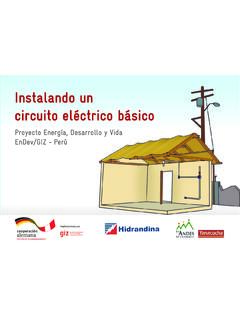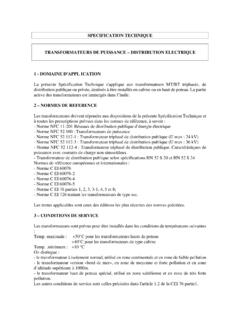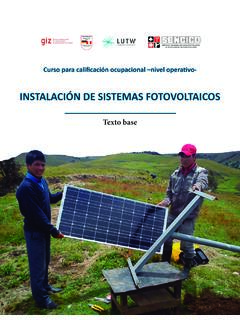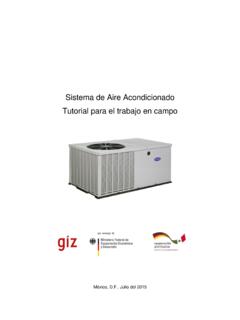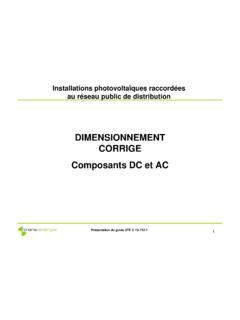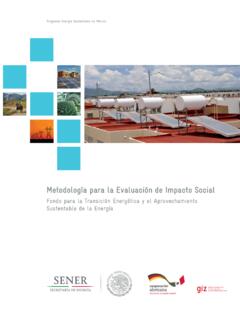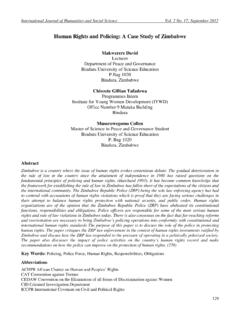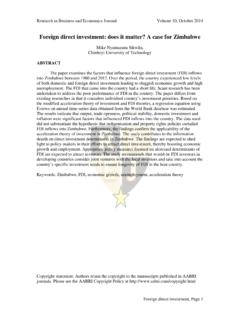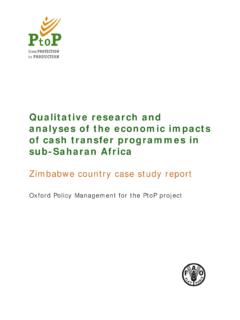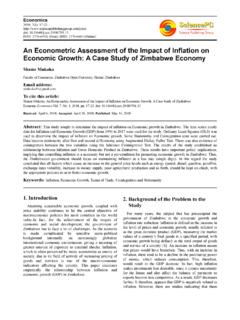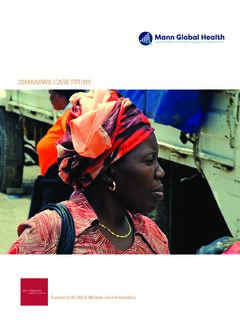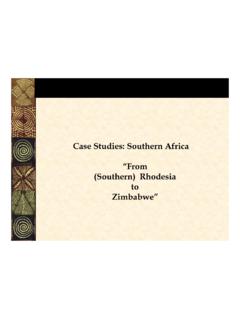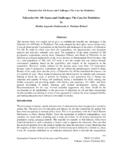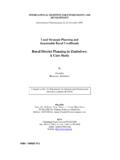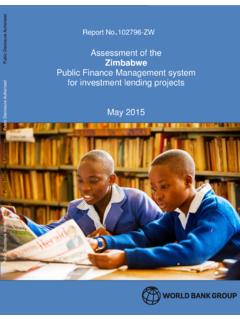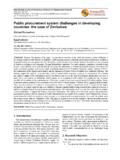Transcription of Zimbabwe Case Study Gap analysis and National Action Plan
1 Supportive framework conditions for mini-grids employing renewable and hybrid generation in the SADC Region Zimbabwe case Study Gap analysis and National Action plan December 2013 This Study has been elaborated on behalf of the Regional Electricity Regulators Association of Southern Africa (RERA) to establish a framework for attracting increased investment in mini-grids employing renewable and hybrid generation in the countries of the Southern African Development Community (SADC). This project has been financed under the Africa-EU Renewable Energy Cooperation Programme (RECP, ), an integral part of the Africa-EU Energy Partnership (AEEP). Supported by: European Union Energy Initiative Partnership Dialogue Facility (EUEI PDF) c/o Deutsche Gesellschaft f r Internationale Zusammenarbeit (GIZ) Box 5180 65726 Eschborn, Germany E I Authors: Economic Consulting Associates and Practical Action (Southern Africa) With comments and contributions by: RERA Secretariat, RERA Workshop Participants, EUEI PDF Date of Publication: 31 December 2013 Zimbabwe case Study .
2 SADC RERA Mini-grids Regional Electricity Regulators Association of Southern Africa Contents i Contents 1 Introduction 1 Background to the Study 1 Outline of the Report and Study Limitations 2 Current Electrification Situation in Zimbabwe 3 Role of Mini-grids 7 Application of SADC Regional Framework for Mini-grids in country case Study 10 2 Assessment of Market needs and demand 13 Existing studies of market needs and demand 13 Universal Access Targets and Plans 13 Gap analysis market needs and demand 14 3 Technology choice and technical regulation 15 Technology choice and resource assessments 15 Technical planning guidelines 15 Gap analysis technology choice and technical regulation 16 4 Ownership, funding and economic regulation 17 Ownership and Funding 17 Economic Regulation 17 Gap analysis ownership, funding and regulation 19 5 Planning and Development Process 20 National development planning framework 20 Role Clarity 20 Gap analysis Role Clarity, planning and development 21 6 National Action plan for Zimbabwe 23 7 Conclusions and Lessons for Regional Guidelines 26 C:\\SADC RERA - Zimbabwe case Study Final Dec 2/1/14 Zimbabwe case Study .
3 SADC RERA Mini-grids Regional Electricity Regulators Association of Southern Africa Contents ii A1 References 28 Terms of Reference for country case Studies 29 A2 Mini-grid case Studies 34 Temaruru wind mini-grid 34 Community Mini-hydro Mini-grids 37 Solar Micro-grids 40 Private Small Power Projects 42 A3 Main contributors to the Study 45 Zimbabwe case Study : SADC RERA Mini-grids Regional Electricity Regulators Association of Southern Africa Tables and Figures iii Tables and Figures Tables Table 1: Key energy policies, legislation and regulations 4 Table 2: Zimbabwe Power Company s Power Station Capacity and Generation 5 Table 3: Mini hydro systems owned and operated by IPPs 7 Table 4: Micro-hydro mini-grids in Zimbabwe 7 Table 5: Small-scale irrigation facility served by solar mini-grids 8 Table 6: Summary of the Zimbabwe Gap analysis and National plan of Action 23 Figures Figure 1: ZESA customer consumption categories 6 Figure 2: Share of energy generated internally and imports 6 Figure 3: Support framework for mini-grids 10 Figure 4: Environment Impact Assessment Process in Zimbabwe 18 Figure 5: Temaruru Wind Powered Mini-grid 34 Figure 6.
4 The skeleton to the towers and remains of the battery house. 35 Figure 7: The remains of the mini-grid network. 35 Figure 8: Solar Powered Mini-grid at Chitora Secondary School, Mutare. 40 Zimbabwe case Study : SADC RERA Mini-grids Regional Electricity Regulators Association of Southern Africa Acronyms and abbreviations iv Acronyms and abbreviations CCDS Centre for Community Development Solutions EIA Environmental Impact Assessment EMA Environmental Management agency ESCO Energy Service Company EU European Union EUEI PDF European Union Energy Initiative Partnership Dialogue Facility EWURA Energy & Water Utilities Regulatory Authority of Tanzania IEA International Energy Agency IPP Independent Power Producer kW kilowatt kWh kilowatthour LP Large project MEPD Ministry of Energy and Power Development MTP Medium
5 Term Development plan MW Megawatt NAC National Action Committee (water sector) NamPower Namibia Power Company NEP National Energy Policy NEPIS National Energy Policy Implementation Strategy NGO Non Governmental Organisation NSSA National Social Security Authority NWEC North West Energy Company, Zambia PA Practical Action PPA Power Purchase Agreement PSC Project Steering Committee RE Renewable Energy REA Rural Electrification Agency REFIT Renewable Energy Feed In Tariff RERA Regional Electricity Regulators Association of Southern Africa RET Renewable Energy Technology SADC Southern Africa Development Community SAPP Southern Africa Power Pool SAZ Standards Association of Zimbabwe SE4 ALL Sustainable Energy for All SEA Sustainable Energy Authority (Sri Lanka) SHP small hydro power SHS Solar Home System SPG Small Power Generator Zimbabwe case Study .
6 SADC RERA Mini-grids Regional Electricity Regulators Association of Southern Africa Acronyms and abbreviations v SPP Small Power Project SPPA Standardised Power Purchase Agreement SSP Small-scale Project STM Standardised Tariff methodology TWG Technical Working Group VSSP Very small-scale Project ZERA Zimbabwe Energy Regulatory Authority ZERO Zimbabwe Energy and Environment Regional Organisation ZESA Zimbabwe Electricity Supply Authority ZETDC Zimbabwe Electricity Transmission and Distribution Company ZINWA Zimbabwe National Water Authority Zimbabwe case Study : SADC RERA Mini-grids Regional Electricity Regulators Association of Southern Africa Executive Summary vi Executive Summary The regional project initiated by the Regional Electricity Regulators Association of Southern Africa (RERA) to create a framework for the development of mini-grids included provisions for two country case studies.
7 Following a request by the Government, Zimbabwe was chosen by RERA as one of the two countries because of the strong expression of interest that was expressed, citing the country s commitment to introduce policies and regulations to promote investment in renewable energy generation. This interest is motivated by a National power crisis, the successful community and private sector investment in existing mini-grids and the absence of policy and legal barriers for mini-grid development. Mini-grids are therefore viewed as a potential quick win strategy for increasing supply in a sustainable, cost effective and environmentally sustainable manner. The Government of Zimbabwe , working through the Renewable Energy and Conservation Department of the Ministry of Energy and Power Development (MEPD), the Zimbabwe Energy Regulatory Authority (ZERA), the National utility (ZESA) and the Rural Electrification Agency (REA) have participated in this Study .
8 It has been supported by non-governmental organisations, academic and research institutions and private sector developers. The Study commenced on 26th August 2013 and was completed with a National Stakeholder Workshop on 25th October 2013. The workshop recommended a second National workshop to review and validate the National Action plan prepared after the first workshop: this is planned for January 2014. The policy and legal framework in Zimbabwe presents no barriers to mini-grid development under different ownership models, with donor-funded community schemes being the most prevalent to date. There is, however, a great need for establishing commercially viable pilot projects that can be models for scale-up because the current community schemes have had mixed operational and financial performance.
9 There is scope for improving the policy and framework for mini-grids using the SADC framework. Gaps in the policy and regulatory environment in Zimbabwe were identified and discussed at the National Stakeholder Workshop and the recommendations and key actions identified to strengthen the framework for mini-grids employing renewables energy and hybrid generation. These are summarized in the following sub-sections. The Action plan is also presented in the form of a table in Section 6. Market Needs and Demand The country does not have a grid and off-grid masterplan for universal access to electricity and other modern energy services. National energy survey data is collected during the National census (the last being in 2012) but is not disseminated and used.
10 It is recommended that: By December 2014, REA shall develop and implement a Rural Energy Master plan that will define the selection and ranking criteria for mini-grid locations and provide indicative least-cost grid and off-grid solutions for universal energy access. Zimbabwe case Study : SADC RERA Mini-grids Regional Electricity Regulators Association of Southern Africa Executive Summary vii By December 2014, MEPD shall have established a system for regular production of annual statistics on energy access and energy resources, starting with the 2012 census data. Technology Choice and Technical regulation With the exception of a wind and some solar mini-grids, existing mini-grids have generally been technically sound.


